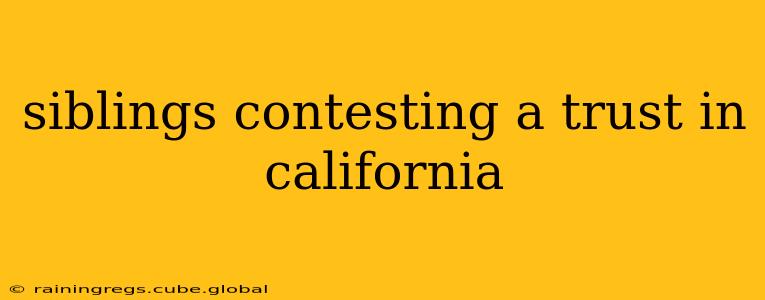Contesting a trust in California, especially when siblings are involved, can be a complex and emotionally charged process. This guide provides crucial information for anyone facing this situation, outlining the grounds for contesting, the process involved, and potential outcomes. Understanding the legal nuances is vital to protecting your rights and interests.
What are the Grounds for Contesting a Trust in California?
Several reasons might lead siblings to contest a California trust. These grounds often revolve around claims of undue influence, lack of capacity, or improper execution of the trust document.
Undue Influence: This is a common ground for contesting. It means someone exerted improper pressure or coercion on the trustor (the person who created the trust) to include or exclude specific beneficiaries or provisions in the trust. Evidence might include suspicious behavior surrounding the creation or amendment of the trust, the trustor's diminished mental capacity, and the beneficiary's benefit from the contested provisions.
Lack of Capacity: If the trustor lacked the mental capacity to understand the nature of their actions when creating or amending the trust, the document might be challenged. This requires demonstrating the trustor suffered from dementia, Alzheimer's disease, or another condition impairing their judgment at the time the trust was created or modified. Medical records and testimony from doctors or family members are crucial in such cases.
Improper Execution: A trust can be contested if it wasn't properly executed according to California law. This might involve issues with the signing, witnessing, or notarization of the document. Any deviation from the legally required procedures could invalidate the trust or specific provisions.
Fraud: If the trustor was deceived or misled into creating or amending the trust, it can be challenged on the grounds of fraud. This requires demonstrating intentional misrepresentation that influenced the trustor's decisions.
Mistake: A less common ground is a mistake in the drafting of the trust. This might involve a clerical error or an unintentional omission that contradicts the trustor's true intentions. Clear evidence of the mistake and the trustor's actual wishes is necessary.
What Happens When Siblings Contest a Trust?
Contesting a trust initiates a legal battle, typically involving the following steps:
-
Filing a Petition: The contesting sibling(s) must file a formal petition with the court challenging the trust. This petition outlines the grounds for the contest and provides supporting evidence.
-
Discovery: Both sides gather evidence through depositions, interrogatories, and document requests. This stage aims to uncover facts relevant to the case.
-
Trial: If the matter isn't settled beforehand, a trial will be held where the judge or jury will hear evidence and determine the validity of the trust.
-
Judgment: The court will issue a judgment, either upholding the trust or invalidating it (or parts of it).
-
Appeal: Either party can appeal the court's decision to a higher court.
How Much Does it Cost to Contest a Trust in California?
The cost of contesting a trust varies greatly depending on the complexity of the case, the amount of assets involved, and the legal representation required. Expect substantial legal fees, expert witness fees, and court costs. The potential financial rewards from a successful contest should be weighed against the significant expenses involved.
How Long Does it Take to Contest a Trust in California?
The timeline for contesting a trust is unpredictable, ranging from several months to several years. The complexity of the legal issues, the amount of evidence involved, and the court's schedule all impact the duration of the proceedings.
Can Siblings Settle a Trust Dispute Out of Court?
Mediation or arbitration can offer alternatives to a costly and time-consuming trial. These methods involve a neutral third party who helps the siblings reach a mutually agreeable settlement. Settlement often avoids the emotional distress and uncertainty of a court battle.
What are the Potential Outcomes of Contesting a Trust in California?
The possible outcomes include:
- The trust is upheld: The court finds the trust to be valid and enforceable.
- The trust is invalidated: The court finds the trust to be invalid due to the grounds for the contest. This may lead to the distribution of assets according to intestate succession (laws governing distribution when a person dies without a will).
- Parts of the trust are invalidated: The court might invalidate specific provisions of the trust while upholding the rest.
- Settlement: Siblings might agree to a settlement outside of court, dividing the assets according to their agreement.
Disclaimer: This information is for educational purposes only and does not constitute legal advice. Anyone facing a trust contest should consult with a qualified California estate attorney to discuss their specific circumstances and legal options. The complexities of trust law require professional guidance to protect your rights.
